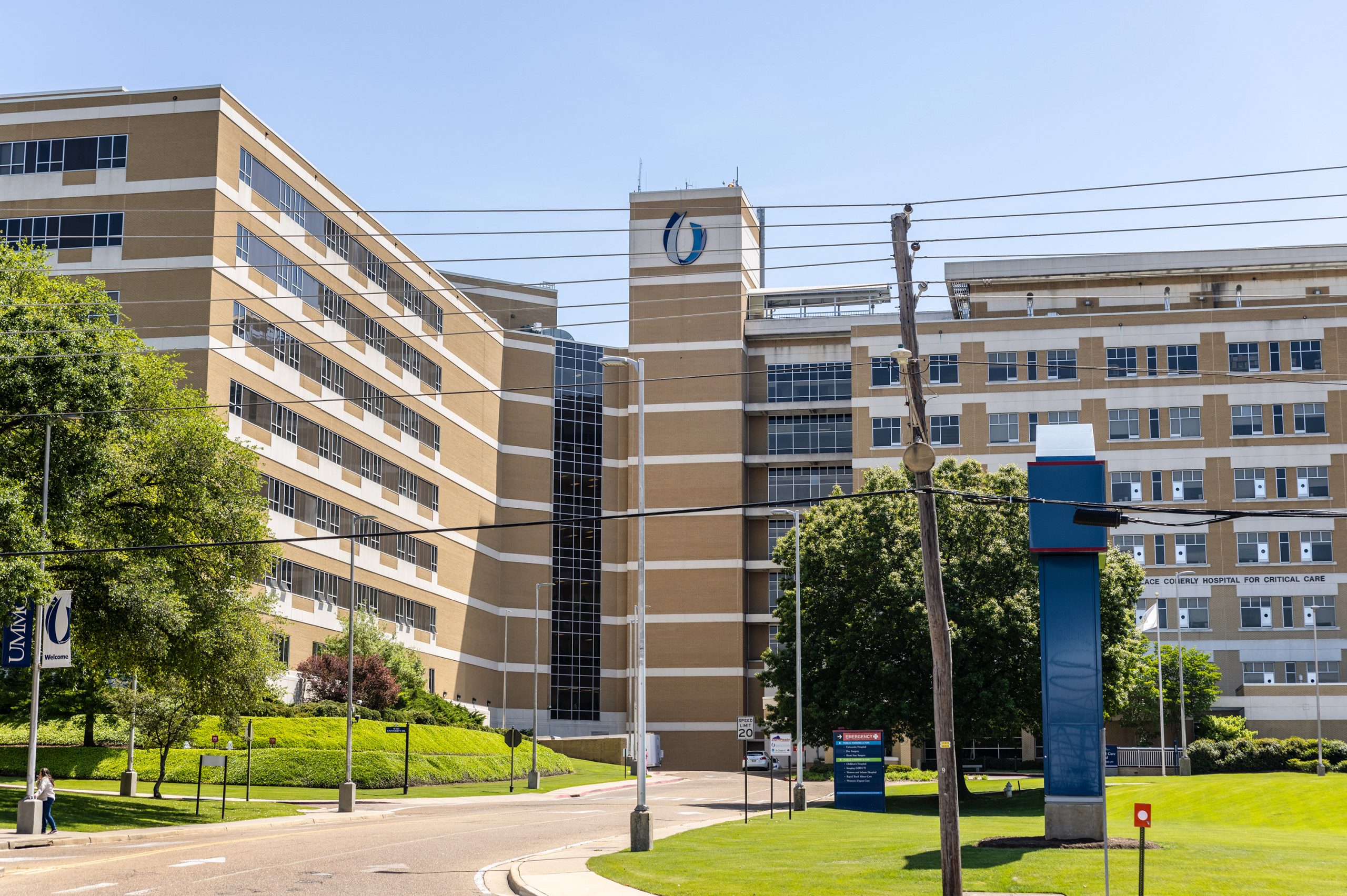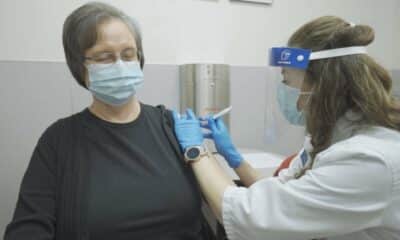Mississippi Today
State Health Department says UMMC is qualified to host Mississippi's next burn center. Its application raises doubts.

State Health Department says UMMC is qualified to host Mississippi's next burn center. Its application raises doubts.
The Mississippi State Department of Health says that the University of Mississippi Medical Center can potentially host a state burn center.
Whether it actually has the qualifications to do so, however, is unclear.
Mississippi's only accredited burn center, housed at Merit Health Center in south Jackson, closed in October amid pandemic-related issues and staffing challenges. Ever since, both UMMC and Mississippi Baptist Medical Center have been competing for the title of the state's next burn center.
In February, a House committee approved giving UMMC $4 million to open a burn center. Mere weeks later, the full House tried to make Mississippi Baptist Medical Center — where the former medical director of Merit's burn center, Dr. Derek Culnan, now practices —the home of the state's next burn center.
However, before the conclusion of the legislative session, both chambers passed a bill that allocates $4 million toward the state's next burn center in the state Health Department's budget, seemingly giving them the responsibility of choosing the burn center's home.
While both Baptist and UMMC have submitted applications to host the state's next burn center, only UMMC has been approved thus far.
UMMC said in a press release on Tuesday that Department of Health officials visited UMMC's campus on March 21 to assess the medical center's compliance with standards for a burn center and has officially “designated” UMMC as a “Mississippi Burn Center.”
However, MSDH spokesperson Liz Sharlot said via email that the department merely has the ability to approve that medical centers are qualified to have a burn center, not choose the home of the state's next burn center.
“UMMC has received designation and so can other hospitals,” Sharlot said. “The law doesn't say we pick, instead, we review the application, complete an inspection and the (state health officer) then designates the facility as a burn center consistent with trauma rules and regulations.”
There is nothing in the law that would prohibit the $4 million going to more than one hospital.
Sen. Briggs Hopson, a conferee on the bill that included the money for a burn center, told Mississippi Today the bill is intended to give the state Health Department the responsibility of assessing which institution could host the state's next burn center.
“We had conflicting data as to which entities would be best suited, so rather than the legislators making that decision without the benefit of a full analysis of who's best suited, we felt like that would be a good place for the Department of Health to review it and analyze what needed to be done as to who's best suited for it,” Hopson said.
UMMC's application shows that none of its burn center physicians iscurrently certified under basic burn care standards. It is also unclear how the burn center's director, Dr. Peter Arnold, meets the qualifications to lead a burn center.
State regulations say a burn center director is required to have completed a burn fellowship or have spent two of the last five years taking care of burn patients. Arnold has been at UMMC for the past five years, while the state's only burn center has been housed at Merit.
When asked about Arnold, a spokeswoman from UMMC referred to an emailed statement sent to Mississippi Today in January.
Dr. Alan Jones, UMMC's associate vice chancellor for clinical affairs, said Arnold has had “extensive training and experience in caring for patients with acute burns and complex wounds in his nearly 20-year career.” He also said that Arnold is assisted at the unaccredited Mississippi Burn Center, which UMMC established in January, by “five other highly qualified, expertly trained plastic surgeons, all of whom have significant experience treating pediatric and adult acutely burned patients.”
UMMC has claimed that it's cared for burn patients since last fall, including pediatric patients, but internal emails revealed otherwise.
However, according to UMMC's burn center application to MSDH, none of the employees involved in the burn center is trained in Advanced Burn Life Support. ABLS training is the standard education for providers who treat patients with burns. Additionally, UMMC's application shows that internal burn care education is currently nonexistent but is in development.
When questioned this week about Arnold and his employees' training, UMMC spokespeople said they had “no further comment.”
Sharlot said that an independent team of consultants found that Arnold met the criteria to serve as a burn center medical director, but did not say how, nor would she say who those consultants were. The same consultants said that UMMC partially met ABLS training requirements and that there was a corrective action plan in place to ensure all staff would receive training.
Culnan, the former burn center's medical director who is now credentialed at Baptist, said his team has nine staff members trained in ABLS, two of whom are ABLS instructors. He has also completed a one-year burn fellowship.
Culnan, a fellowship-trained burn surgeon, was sued by his former employer and the operator of the center at Merit Health Central, Joseph M. Still (JMS) Burn Center Inc., for allegedly violating his employment contract by soliciting JMS employees to join his new company. He created the new company after Merit Health Central announced it would be closing the burn center. Kimberly Alexander, a spokesperson for Baptist, said the lawsuit has been resolved.
“We have submitted our application as a burn center and expect to have a survey soon,” Alexander said. “We are continuing to care for burn patients daily.”
State burn center funds from the bill are not available until July, according to Sharlot.
This article first appeared on Mississippi Today and is republished here under a Creative Commons license.
Mississippi Today
Renada Stovall, chemist and entrepreneur
Renada Stovall sat on the back deck of her rural Arkansas home one evening, contemplating life when she had a life-altering epiphany…
“I gotta get out of these woods.”
She heard it as clear as lips to her ear and as deep as the trees surrounding her property. Stovall's job as a chemist had taken her all over the country. In addition to Arkansas, there were stints in Atlanta, Dallas and Reno. But she was missing home, her parents and friends. She also knew, she needed something else to do.
“I thought, what kind of business can I start for myself,” said Stovall, as she watered herbs growing in a garden behind her south Jackson home. Some of those herbs are used in her all-natural products. “I know when I lived in Reno, Nevada, where it's very hot and very dry, there really weren't products available that worked for me, my hair, and my skin suffered. I've got a chemistry degree from Spelman College. I took the plunge and decided to create products for myself.”

In 2018, Stovall's venture led to the creation of shea butter moisturizers and natural soaps. But she didn't stop there, and in December 2022, she moved home to Mississippi and got to work, expanding her product line to include body balms and butters, and shampoos infused with avocado and palm, mango butter, coconut and olive oils.
Nadabutter, which incorporates Renada's name, came to fruition.

Stovall sells her balms and moisturizers at what she calls, “pop-up markets,” across the state during the summer. She's available via social media and also creates products depending on what of her ingredients a customer chooses. “My turmeric and honey is really popular,” Stovall added.
“The all-natural ingredients I use are great for conditioning the skin and hair. All of my products make you feel soft and luscious. The shea butter I use comes from West Africa. It's my way of networking and supporting other women. And it's my wish that other women can be inspired to be self-sufficient in starting their own businesses.”





This article first appeared on Mississippi Today and is republished here under a Creative Commons license.
Mississippi Today
On this day in 1954
MAY 17, 1954

In Brown v. Board of Education and Bolling v. Sharpe, the U.S. Supreme Court unanimously ruled that the “separate but equal” doctrine in Plessy v. Ferguson was unconstitutional under the 14th Amendment, which guaranteed equal treatment under the law.
The historic decision brought an end to federal tolerance of racial segregation, ruling in the case of student Linda Brown, who was denied admission to her local elementary school in Topeka, Kansas, because of the color of her skin.
In Mississippi, segregationist leaders called the day “Black Monday” and took up the charge of the just-created white Citizens' Council to preserve racial segregation at all costs.
This article first appeared on Mississippi Today and is republished here under a Creative Commons license.
Mississippi Today
Every university but Delta State to increase tuition this year
Every university in Mississippi is increasing tuition in the fall except for Delta State University.
The new rates were approved by the governing board of the eight universities, the Institutions of Higher Learning Board of Trustees, at its regular meeting Thursday.
The average cost of tuition in Mississippi is now $8,833 a year, a roughly 3% increase from last year. Students can expect to pay tuition ranging from $7,942 a year at Mississippi Valley State University to $10,052 a year at Mississippi State University.
In recent years, universities have cited inflation and rising insurance costs as reasons for the tuition increases. At Thursday's meeting, the board heard a presentation on how property insurance is becoming more expensive for the eight universities as Mississippi sees more tornadoes and storms with severe wind and hail.
READ MORE: Tuition increases yet again at most public universities
But it's an ongoing trend. Mississippi's public universities have steadily increased tuition since 2000, putting the cost of college increasingly out of reach for the average Mississippi family. More than half of Mississippi college students graduated with an average of $29,714 in student debt in 2020, according to the Institution for College Access and Success.
At Delta State University, the president, Daniel Ennis, announced that he will attempt to avoid tuition increases as the regional college in the Mississippi Delta undergoes drastic budget cuts in an effort to become more financially sustainable.
“We will resist tuition increases so that our most economically vulnerable students can continue to have access to the opportunities that a college degree can provide,” he wrote in a memo to faculty and staff on Monday. “We will move beyond basic survival and into a place where we have the capacity to take better advantage of our undeniable strengths.”
Delta State didn't increase tuition last year, either. Officials have been concerned the university is becoming too pricey for the students it serves.
Tuition for the 2024-25 academic year, by school:
- Alcorn State University: $8,105
- Delta State University: $8,435
- Jackson State University: $8,690
- Mississippi State University: $10,052
- Mississippi University for Women: $8,392
- Mississippi Valley State University: $7,492
- University of Mississippi: $9,612
- University of Southern Mississippi: $9,888
This article first appeared on Mississippi Today and is republished here under a Creative Commons license.
-
SuperTalk FM5 days ago
Martin Lawrence making 3 stops in Mississippi on comedy tour
-
Our Mississippi Home4 days ago
Beat the Heat with Mississippi’s Best Waterparks
-
Our Mississippi Home5 days ago
Charlie’s U-Pik: Opening Soon for the Summer Season
-
Mississippi News Video7 days ago
Local dentists offer free dental care in Amory
-
SuperTalk FM18 hours ago
State auditor cracking down on Mississippians receiving unemployment benefits
-
Mississippi News Video3 days ago
Jackson has a gang problem
-
Kaiser Health News4 days ago
Medicaid ‘Unwinding’ Decried as Biased Against Disabled People
-
Mississippi Today7 days ago
On this day in 1968







































